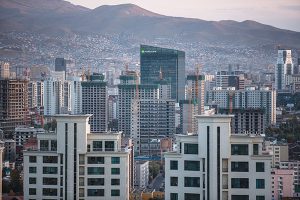Bloomberg
Mongolia is facing a worsening foreign currency crunch following Russia’s war with Ukraine and a slump in China’s economy, forcing local banks to
restrict the amount of dollars customers can buy.
Khan Bank, the country’s largest bank measured by total assets, limited the daily amount of cash that can be converted into foreign currencies to 1 million tugrik ($300) from this month, Vice President of Wholesale Banking Uuganbayar Terbish said in an interview. That’s down from as much as 300 million tugrik under normal banking conditions and 100 million tugrik in June, he said.
Multiple bank customers who’ve tried to transfer funds at four different commercial banks in recent weeks confirmed they were limited to a daily foreign exchange amount of 1 million tugrik.
“These are not capital controls, but market liquidity issues,†said Uuganbayar, adding that the restrictions were a response to the increased demand for dollars and to guard against speculation. He said the bank wasn’t limiting payments for the import of goods such as food and fuel, and exceptions could be made with approval from the treasury department.
Mongolia is facing an increasingly serious foreign currency crunch, with foreign exchange reserves down 40% in August from a year earlier to $2.7 billion and the current account deficit ballooning. In addition, the tugrik has taken a beating due to interest rate hikes overseas, losing 16% of its value against the dollar this year. The central bank has repeatedly hiked interest rates this year in an attempt to rein in high inflation and curb the currency outflows.
The nation’s economic problems stem in part from its two huge neighbours: Russia and China. Beijing’s Covid Zero policies have disrupted trade across the border, while the war in Ukraine has not only driven up the price of imported fuel and goods but also blocked access to some Russian banks, which had been an important part of the nation’s financial system.
The situation is somewhat reminiscent of the crisis in 2016, when a slump in global commodity markets forced Mongolian banks to ration foreign currency and the country eventually had to ask the International Monetary Fund for a bailout.
“There’s always risk†of the country needing another bailout from the IMF, according to Adrienne Lui, an economist at Citigroup Inc. in Hong Kong, although there are many more positives now. Commodity prices are still high, and the government is stable, she said.
While Lui said she didn’t think the situation in Mongolia was comparable to the crises in Pakistan or Sri Lanka, the tugrik’s “depreciation will continue as long as balance of payments stress remains,†she said.
The Asian Development Bank approved a $100 million emergency loan for the country in August to “help it weather the impacts of severe economic shocks.†The Asian Infrastructure Investment Bank on September 29 approved another $100 million financing in cooperation with the ADB in a program to assist government financing, provide aid to the vulnerable, and counteract imported inflationary pressures.
 The Gulf Time Newspaper One of the finest business newspapers in the UAE brought to you by our professional writers and editors.
The Gulf Time Newspaper One of the finest business newspapers in the UAE brought to you by our professional writers and editors.
